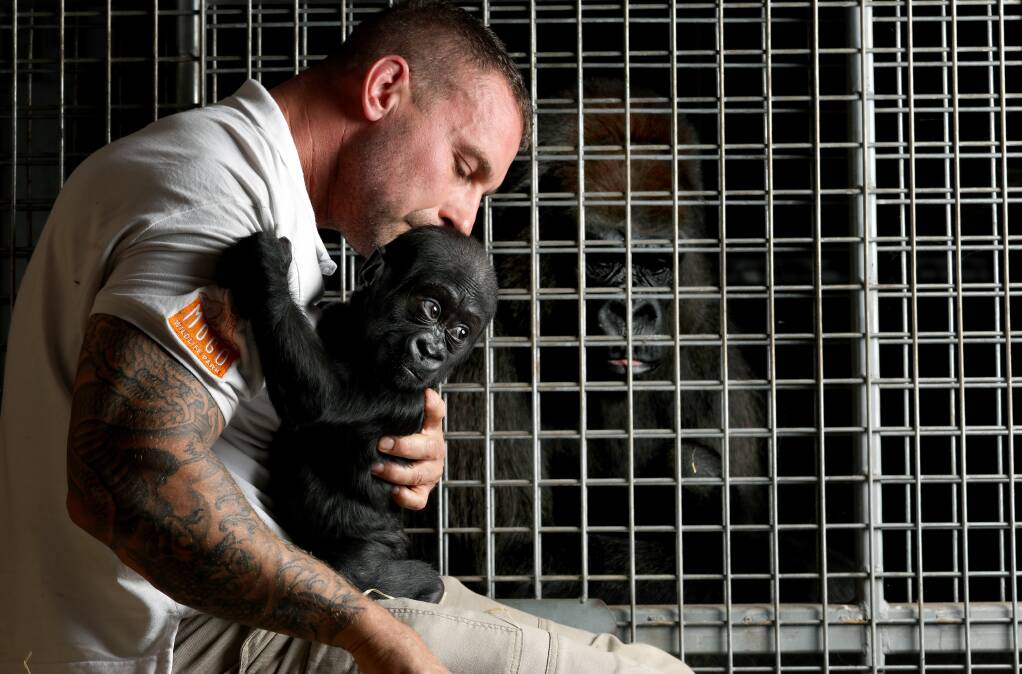
His little fingers hold on tight as his eyes, wide with infant curiosity, take in the activity around him.
Crowned by a tuft of jet black hair, his little head tilts back to see what the two strangers in his bedroom are up to. Cradled in strong arms, he's both inquisitive and secure - just like any well-adjusted baby in the loving care of a parent.
But Kaius is no ordinary baby. He's a four-month-old western lowland gorilla and his "parent" is Chad Staples, zookeeper at Mogo Wildlife Park on the NSW South Coast.
Born late October to first-time parents Kisane and mum Kipensi, Kaius arrived after a normal pregnancy and what, at first, appeared to be an uncomplicated birth.
"The birth itself was fairly undramatic," says Chad. After about three hours of labour, baby Kaius came into the world and Kipensi did all the expected motherly things.
"There was lots of grooming to clean him up, attempts to suckle, just that first-time motherly stuff: 'Oh my goodness, I've got a baby. What do I do now?' But it was all very, very positive."
After a few hours, though, Kipensi had not passed the placenta and dad Kisane took bay Kaius from his mother and held him for 14 hours. Intervention became necessary. The placenta would have to be removed, which would involve sedating the mother. And Kaius would need to be taken from his dad and fed.
"We wrapped him up and did a real check over him because he'd been with dad for 14 hours and then I did a bottle feed just to rehydrate him. It was a horrible wettish day so we had to warm him up but thankfully he was perfect. He was completely unscathed, which was great."
As mum recovered overnight, Chad kept baby Kaius with him, feeding him every two hours. The plan was to reunite the baby with his mother at first light.
"Unfortunately, they wanted nothing to do with him, which was strange because I'd even held him down there with the family group while mum had the procedure so that there wasn't that separation. But they didn't want a bar of him." After watching the lack of interaction for several hours on CCTV, they noticed an alarming change in the baby gorilla.
"He'd lost his colour, looked very dull in the eyes and was getting quite cool, even though he was well wrapped up. We brought him up to the vet block and started to intervene because it was pretty clear something was wrong. Over the next few hours he continued to get worse and started to crash and we reached out to the doctors we'd consulted on the pregnancy plans to now talk to us about infant care."

Since then that care has fallen to Chad and his fellow keepers. It's been an emotional journey but one which has given insight into just how similar the human and gorilla species are.
It's an adventure Chad has shared with his 512,000 Instagram followers.
"It's been an incredible amount of pressure, like nothing I've ever experienced before. This is a critically endangered species. Every single individual is known by name throughout the world. So you feel that weight of needing to do this well," Chad says.
"That first week it started off feeding him through a nasal tube. He was hooked up to a drip to be given fluids constantly. He had a respirator on to help his breathing, plus a heart monitor. This poor little baby who was over two kilos was hooked up to everything you could imagine. I spent that entire time with him."
Just like a human baby, Kaius needed emotional as well as physical nourishment.
"What finally helped him so much was doing that skin to skin contact like you would do with a premature baby where his little heart and my heart sort of got in sync and he just relaxed into it."
Thankfully, the early perils Kaius faced are behind him. According to Chad, he's growing into a healthy, normal gorilla.
"They don't cry like a baby but he can certainly do an alarm call or cry-out if something happens and all of a sudden he feels scared. He does laugh, though, which is the coolest thing ever. He's ticklish and again just like with a baby it's important to have those interactions because mum would be doing it. It's a beautiful thing to watch and be part of."
The challenge now is to assimilate him into the group and to that end, Chad and the keepers have enlisted the help of 43-year-old female gorilla G-Anne, who they hope will become baby Kaius's surrogate mum.
"The goal is to always get them back. You're playing a role now but to do your role successfully means they're not going to be reliant on you," Chad says.
Kaius spends days alongside G-Anne, separated by the steel mesh of their enclosures. When we visit, the older gorilla approaches protectively, to check we present no threat to the infant. The hope is that the matriarch will take Kaius under her wing to help him assimilate into the group. Chad knows the day the baby joins the group will be momentous.
"Yes, it will be hard. Yes, it will be stressful. Gorillas are huge, they're powerful, they're under as much stress as what we are in this situation. I'll be terrified but that's the goal and that's what I'm looking forward to."







